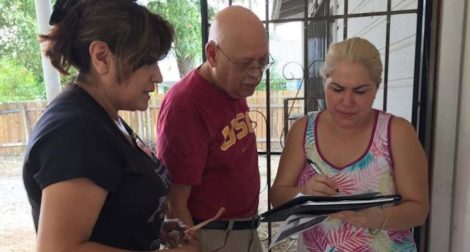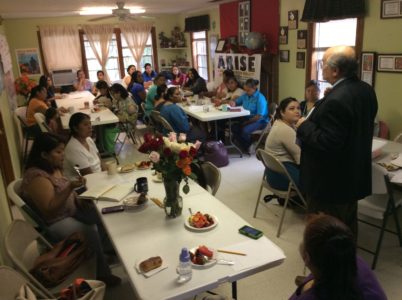Chapter 1 of the IDRA Family Engagement – Technical Assistance Toolkit
This short video is an excellent planning and critical dialogue starter for developing an approach to family engagement that makes families strong partners and advocates for neighborhood public schools.
Family leadership in education goes beyond the traditional approaches of volunteerism and fundraising for the school or improving the parenting skills of families. This video sets the tone for the four that follow, expanding on the notion of Family Leadership in Education.
Valuing All Families
Our use of the word valuing is deliberate and pragmatic. We wish to champion and speak for the inclusive, nondiscriminatory and triumphalist idea that all families (particularly those who are economically disadvantaged, minority or speak a language other than English) are inherently good and worthy of being treated with respect, dignity and value.
IDRA’s goal is bigger than parent involvement, rather it is family leadership in education. This model is a vision of all families as advocates of excellent neighborhood public schools. We consider leadership the culminating set of activities in a spectrum of parent participation. In this context, leadership is:
- inclusive,
- expanding,
- based on peer support and rotating responsibilities,
- ongoing invitation and support of new leadership,
- connecting parents and communities across race, ethnic and class divisions,
- focusing on collective action for the good of all children, and
- building relationships and trust that are essential to the process.
The characteristics we encourage in the development of leadership are in contrast to some traditional parent leadership models that emphasize individual assertiveness and charismatic advocacy. Our process supports parents in learning to work in groups, planning and carrying out activities, speaking in front of groups, and developing other personal skills and traits that develop the individual. But, our emphasis is on collective action, listening to peers, and revolving tasks and leadership roles.
Families and School Holding Power – Parent-Led Surveys Present Insights
Whether or not a family’s children are in school, all families need to know how schools are doing in keeping school-age children in school and succeeding in their studies.
Families can use the data to further investigate the why’s and wherefores’ of the issue. Schools need to know what families think and more importantly how families and schools can partner to meet the challenge.
See Families and School Holding Power article
Families Transforming Public Schools – Gathering Data, Informing Policy and Practice
Given the current challenges in public education and the critical need that our public schools survive and grow, it is crucial that those closest to their schools propose the solutions. Parents across the country are coming together to ensure equitable and excellent public schools for all children. In contrast to traditional parent participation through volunteering and fundraising, these families are collecting data, surveying their communities and informing public education policy and practice.
In the states served by the IDRA EAC-South (one of four national equity assistance centers), from Texas to Florida and Washington, D.C., communities and schools are working toward improvement. Following are examples of parents and communities in Louisiana, Georgia, Arkansas, Mississippi and Texas who are taking action.
See Families Transforming Public Schools article
Building Parent Voice for Action – Podcast Episode 146
 Families need to know how schools are doing, and they can use available data to give them a big picture view of their neighborhood public school. But parents can also dig deeper by surveying each other.
Families need to know how schools are doing, and they can use available data to give them a big picture view of their neighborhood public school. But parents can also dig deeper by surveying each other.
In this podcast episode, Aurelio M. Montemayor, M.Ed., IDRA senior education associate, describes how some family groups have conducted parent-to-parent surveys, finding common goals and concerns. The process is helping their schools listen to families and more importantly is helping families and schools partner together to meet the challenge.



